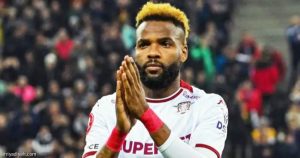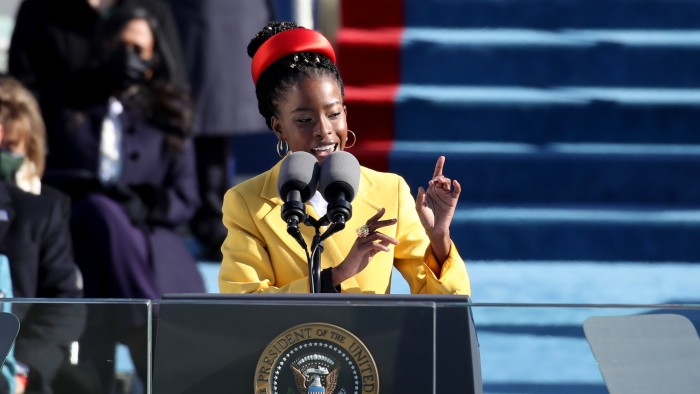Summarize this content to 2000 words in 6 paragraphs in Arabic Unlock the Editor’s Digest for freeRoula Khalaf, Editor of the FT, selects her favourite stories in this weekly newsletter.Poets rarely have the chance to speak directly to history, to bring listening millions together with their words. In 2013, at Barack Obama’s second inauguration, Richard Blanco — immigrant, gay — seemed to herald a shining, inclusive America, reading from “One Today” to a standing ovation: “My face, your face, millions of faces in morning’s mirrors . . . All of us as vital as the one light we move through.”Amanda Gorman was just 22 when her inaugural poem, “The Hill We Climb”, read for Joe Biden’s presidency in 2021, made her a breakout star: “For there is always light, if only we’re brave enough to see it./ If only we’re brave enough to be it.” Now, four years on, Donald Trump will take the oath of office for the second time, offering his rejoicing voters a Make America Great Again victory rally, a fireworks display, and three inaugural balls — but no poet to sound a flourish of trumpets. At their best, poets can shine on the big day, capturing dreams and longingsThe tradition of the inaugural poem has been lopsided in the US. Only four presidents, all of them Democrats, have invited a total of six poets to read at their inaugurations — John F Kennedy, Bill Clinton (twice), Barack Obama (twice) and Joe Biden. At their best, as Gorman and Blanco demonstrate, poets can shine on the big day, capturing dreams and longings or helping define a new presidential era. It’s a tricky genre to pull off — wisdom so swiftly descends into pomposity, the finest of lines separates the beautiful from the banal.A sharp wind and the glare of light on the snow rescued Robert Frost, the first to start the tradition at Kennedy’s inauguration in 1961. He planned to read “Dedication”, which begins cautiously: “Summoning artists to participate/ In the august occasions of the state/ Seems something artists ought to celebrate.” That “seems” speaks volumes; the doggerel grows worse: “Courage is in the air in bracing whiffs/ Better than all the stalemate an’s and ifs.” Fortunately, he never delivered it.In the blurred video from the inauguration, the wind whips up, the paper trembles in Frost’s cold-stiffened hands. He stumbles, once, again: “I can’t see in this light.” From memory, Frost recites “The Gift Outright”, a far better poem. His white hair flutters like a flag in the rising wind. His voice rings strong and clear, staking a claim: “The land was ours before we were the land’s/ She was our land more than a hundred years/ Before we were her people.”In the UK, poets laureate are appointed by the monarch — traditionally paid in a “butt of canary wine”, they also receive a modest salary. Some, like Imtiaz Dharker, duck the “huge honour”; others gladly step up. When much of the work churned out by poets laureate is glib or forgettable, why do we need a poet at an inauguration, or a coronation? Perhaps it’s because we hope for words that act as signpost and lighthouse; throughout history, we’ve turned to poets, PB Shelley’s “unacknowledged legislators of the world”, for clarity and inspiration, to tell us what we could be as much as what we are. And sometimes, even in the brief annals of inaugural poets, they have. At Bill Clinton’s 1993 inauguration, Maya Angelou reminded all of America of its past of slavery when she read, “On the Pulse of Morning”: “You the Ashanti, the Yoruba, the Kru, bought,/ Sold, stolen, arriving on the nightmare/ Praying for a dream.” Elizabeth Alexander’s “Praise Song for the Day”, read for Barack Obama’s inauguration in 2009, asked “What if the mightiest word is love?”, recasting the idea of national fraternity as “love that casts a widening pool of light”. Turning away from presidents and kings, the UK’s poet laureate Simon Armitage wrote of an anonymous woman, “just a person like everyone else”, who’s treated herself to “new shoes” in order to attend King Charles III’s coronation in his 2023 ode, “An Unexpected Guest”. And though Trump refrained from inviting a poet to speak at his first inauguration, in 2017, poets across America read protest poetry, organising evenings of resistance. Carol Ann Duffy, then serving as the first woman poet laureate of England, had her eye on events across the pond when she wrote “Swearing In”, published in her 2018 collection, Sincerity. “Swearing In” is not an inaugural poem. But it is memorable, opening with a clash of cymbals: “Combover, thatch-fraud, rug-rogue, laquer-lout; twitter-rat, tweet-twat, tribe-gob, muckspout.” Trump, soon to be the 47th President of the United States, may have been wise to sidestep the poets; they do tend to have the last word. Join our online book group on Facebook at FT Books Café and follow FT Weekend on Instagram and X
rewrite this title in Arabic When poetry heralds a new presidential era
مقالات ذات صلة
مال واعمال
مواضيع رائجة
النشرة البريدية
اشترك للحصول على اخر الأخبار لحظة بلحظة الى بريدك الإلكتروني.
© 2025 جلوب تايم لاين. جميع الحقوق محفوظة.




